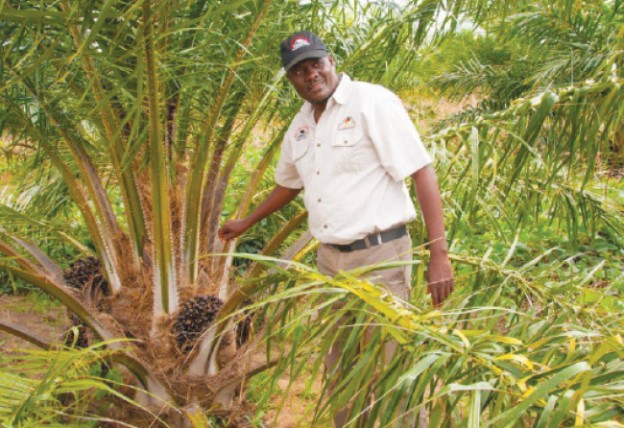



Mr Mwiinga, who is managing Zambeef’s 20,000-hectare Zampalm plantation
The Zambian government has pledged support for Zambeef’s pioneering Zampalm plantation in Muchinga Province in order to ensure the flagship palm oil project reaches its full potential.
The commitment from President Edgar Chagwa Lungu came as he visited the 20 000 hectare Zampalm plantation on Sunday, when the government was invited by Zambeef Joint Chief Executive Officer Francis Grogan to join hands with the company to form a model public-private partnership (PPP).
President Lungu said: “I wish to guarantee you that government will be able to support this project up to fruition. Let me underscore that this project has our total support, but it is only going to be a success by how much it improves the lives of our people here in this community.”
He added: “IDC, which I am privileged to chair as board chairman, will look into the prospects of having outgrower schemes, working jointly with you, to take off as soon as possible.”
Zampalm plans to engage up to 13,000 small-scale farmers as outgrowers to the plantation, which already has some 370,900 palms planted over an area of 2,612 hectares in the main plantation, with another 39,000 seedlings in the main and pre-nursery.
The total investment cost of the whole project will be approximately US$40 million, of which Zambeef has spent US$21 million so far. At current prices and at an average production of 3 to 3.5 tonnes per hectare Zampalm could generate more than US$170 million in revenue over the next decade.
“This project will require a further US$24m investment over the next five years, which includes the planting of a further 1,400 hectares and the upgrading of the mill to a 20 tonne- per-hour mill. In funding this project to maturity we invite Zambian institutions such as IDC and NAPSA to consider co-investing with Zambeef to ensure this project achieves its full potential,” said Grogan.
Zampalm was established by Zambeef in 2009 in response to calls from the government for increased national food security, poverty alleviation, import substitution, job creation and rural development in what is now Muchinga Province.
Since then the company has transformed the barren floodplain area into a flagship developmental agriculture project with a significant positive impact on the local community, wider society and the nation’s economy as a whole.
“The production of palm oil here will assist with food security; the rural area of Chief Kopa’s Chiefdom has seen real development and poverty alleviation; We are well on our way towards the import substitution of edible oil that our economy needs; 180 permanent jobs have been created in the area – with more to come; and we have developed a new primary industry in Muchinga Province in a pioneering sector that has never before been established in this part of Zambia,” said Grogan.
The medium- to long-term vision is to incorporate 5,000 outgrowers around the estate, and a further 8,000 within the district, following a similar that has successfully been undertaken in Uganda.
Zampalm and its outgrower scheme will contribute to the substitution of the 70,000 tonnes of edible oil currently imported into this country every year, saving Zambia around US$70 million in foreign exchange outflows every year.
Lungu said: “Your prospect on developing an outgrower scheme is most welcome. We have seen thus success of the sugar production through outgrower support schemes in Zambia; and you have told me the success story of outgrowers in Uganda. So we will help you in ensuring that this outgrower scheme kicks off in the shortest possible time, because we want these people to be their own business managers.”
Grogan said: “The demand for edible oils in Zambia is huge and will continue to grow as the country develops; and Mpika should be the home of oil palm production in Zambia. We would like to see the community benefit and make palm oil production a characteristic of the area just as Mwinilunga is for pineapples or Mazabuka for sugar,” he added. “At Zambeef we firmly believe in Zambia’s true potential to feed the region. Working hand-in-hand with the government we can convert this vision into reality for the benefit of all Zambians.”
Follow us on Twitter on @FingazLive and on Facebook – The Financial Gazette